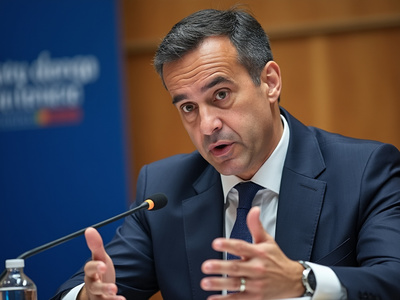Trump Sets Plans to Restructure the Federal Workforce and Confront the 'Deep State'
President-elect Donald Trump intends to revamp the federal workforce, focusing on career employees he and his supporters view as components of the 'deep state.'
President-elect Donald Trump is gearing up for a major overhaul of the U.S. federal workforce, intending to dismantle what he and his supporters term the 'deep state.' With the inauguration approaching, those familiar with his transition suggest these changes might start as soon as he takes office.
A crucial part of the plan includes an executive order to remove job protections from up to 50,000 federal workers, allowing political appointees to take their places.
This initiative aims to infuse government positions with political loyalists across various agencies, focusing on quickly filling political posts.
The Trump administration has already requested the resignation of senior diplomats at the U.S. State Department, in line with his broader goal of restructuring the federal bureaucracy.
A key player in the transition is Russell Vought, nominated to return as the director of the Office of Management and Budget. Vought previously assisted in crafting the Schedule F reclassification order, enabling agencies to convert career roles into political ones.
This would facilitate the administration in dismissing employees without cause and replacing them with loyalists.
Other notable nominees, such as Attorney General Pam Bondi and national security advisor Mike Waltz, have shown support for reshaping the federal workforce.
The Trump team has openly criticized federal bureaucrats as obstructing their agenda during his first term, accusing some officials of delaying initiatives in various departments, like Justice and Education.
Critics, including federal employee unions, argue that the 'deep state' concept is a conspiracy theory crafted to justify an executive power overreach.
They caution that policies such as Schedule F could create a culture of fear and silence in the federal workforce, ultimately affecting government efficiency.
As the Trump administration prepares for these extensive changes, efforts have already begun to identify federal employees opposed to the new direction, with groups like the American Accountability Foundation naming individuals in the military and other agencies they consider unsupportive of Trump’s priorities.
The impact of these plans, including the potential for mass dismissals and job reclassification, will rely on the pace of the Trump administration's actions and the reaction of federal employees and lawmakers.
A crucial part of the plan includes an executive order to remove job protections from up to 50,000 federal workers, allowing political appointees to take their places.
This initiative aims to infuse government positions with political loyalists across various agencies, focusing on quickly filling political posts.
The Trump administration has already requested the resignation of senior diplomats at the U.S. State Department, in line with his broader goal of restructuring the federal bureaucracy.
A key player in the transition is Russell Vought, nominated to return as the director of the Office of Management and Budget. Vought previously assisted in crafting the Schedule F reclassification order, enabling agencies to convert career roles into political ones.
This would facilitate the administration in dismissing employees without cause and replacing them with loyalists.
Other notable nominees, such as Attorney General Pam Bondi and national security advisor Mike Waltz, have shown support for reshaping the federal workforce.
The Trump team has openly criticized federal bureaucrats as obstructing their agenda during his first term, accusing some officials of delaying initiatives in various departments, like Justice and Education.
Critics, including federal employee unions, argue that the 'deep state' concept is a conspiracy theory crafted to justify an executive power overreach.
They caution that policies such as Schedule F could create a culture of fear and silence in the federal workforce, ultimately affecting government efficiency.
As the Trump administration prepares for these extensive changes, efforts have already begun to identify federal employees opposed to the new direction, with groups like the American Accountability Foundation naming individuals in the military and other agencies they consider unsupportive of Trump’s priorities.
The impact of these plans, including the potential for mass dismissals and job reclassification, will rely on the pace of the Trump administration's actions and the reaction of federal employees and lawmakers.
Translation:
Translated by AI
AI Disclaimer: An advanced artificial intelligence (AI) system generated the content of this page on its own. This innovative technology conducts extensive research from a variety of reliable sources, performs rigorous fact-checking and verification, cleans up and balances biased or manipulated content, and presents a minimal factual summary that is just enough yet essential for you to function as an informed and educated citizen. Please keep in mind, however, that this system is an evolving technology, and as a result, the article may contain accidental inaccuracies or errors. We urge you to help us improve our site by reporting any inaccuracies you find using the "Contact Us" link at the bottom of this page. Your helpful feedback helps us improve our system and deliver more precise content. When you find an article of interest here, please look for the full and extensive coverage of this topic in traditional news sources, as they are written by professional journalists that we try to support, not replace. We appreciate your understanding and assistance.













